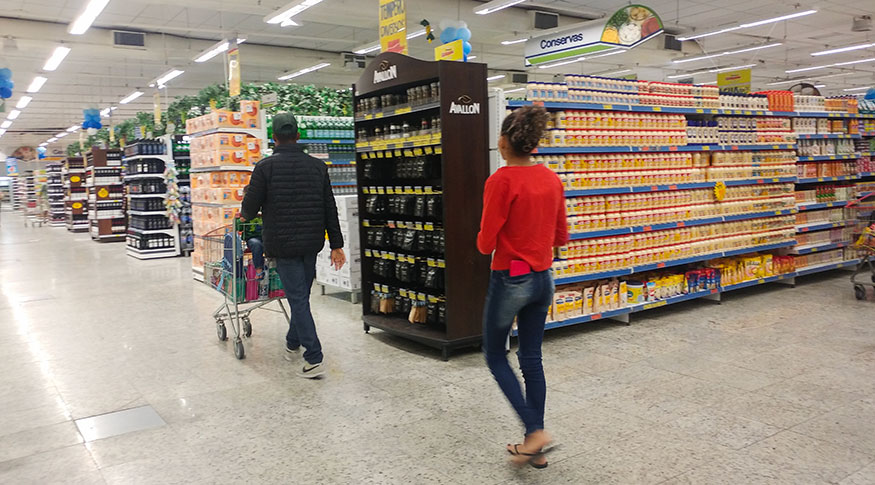Monthly Survey of Trade
Trade changes by -0.3% in July and records fourth negative result in a row
September 11, 2025 09h00 AM | Last Updated: September 12, 2025 02h36 AM

Retail sales fell 0.3% in July from June. This is the fourth consecutive negative result for the sector, which has a cumulative loss of 1.1% loss in the period. Against July 2024, sales volume grew for the fourth consecutive year, with a 1.0% increase. Retail sales had a cumulative growth of 1.7% year-to-date. The 12-month increase was 2.5%.
Data comes from the Monthly Survey of Trade (PMC), released today (11) by the IBGE.
As for extended retail trade, which includes Vehicles, motorcycles, parts and pieces, Construction material, and Wholesale of food products, beverages, and tobacco, sales volume grew 1.3% in July from June. Against July 2024, there was a 2.5% decline. Year-to-date and 12-month increase rates for extended retail are -0.2% and 1.1%, respectively.
Cristiano Santos, manager of the survey, explains that these four consecutive months without increase in the seasonally adjusted series indicate a short-term loss of momentum. "Since March, the last month with increase, the sector has already seen a 1.1% drop in sales," Cristiano assesses. He adds that there is a type of base factor in this slow and continuous decline, as March represents the peak of the seasonally adjusted series.
The survey shows a balance between negative and positive rates in retail trade from June to July. Office, computer and communication material and equipment (-3.1%), Fabric, wearing apparel, and footwear (-2.9%), Other personal and household artilces (-0.6%), and Hypermarkets, supermarkets, food products, beverages, and tobacco (-0.3%) recorded decreases. The increases were due to Furniture and household appliances (1.5%), Books, newspapers, magazines, and stationery (1.0%), Fuels and lubricants (0.7%), and Pharmaceuticals, medical and orthopedic articles and toiletries (0.6%).
As for extended retail sales, Vehicles and motorcycles, parts and pieces increased by 1.8%, while Construction material changed by 0.4%. Wholesale of food products, beverages, and tobacco is not part of this comparison due to an insufficient number of months for seasonally adjusted modeling.
Despite this balance between positive and negative results of the activities, Cristiano believes that this persistent negative scenario over the last four months is distributed across sectors. "In July, six of the eight retail activities were operating below the level recorded in March. In this case, furniture and household appliances and pharmaceuticals remained above the March level," he highlights.
The PMC manager assesses that, despite the reduction in inflation pressure due to the fall of food prices in July, hypermarkets and supermarkets sales remain stable for the fourth consecutive month. "The electronics, IT, and communications equipment sector, on the other hand, experienced the largest decline from June to July, with two consecutive months of decline. Prior to that, the performance was highly volatile, with increase and decline month after month, which reflects business strategies in the face of the sharp fluctuations of the dollar," explains Cristiano.
Six of the eight activities recorded positive results against July 2024
Against the same month a year ago, the 1.0% increase in retail was observed in six of the eight activities: Pharmaceuticals, medical and orthopedic articles, and toiletries (3.8%), Books, newspapers, magazines, and stationery (3.4%), Furniture and household appliances (3.2%), Other personal and household articles (1.5%), Fuels and lubricants (1.0%), and Hypermarkets, supermarkets, food products, beverages, and tobacco (0.4%). The two activities that declined in this comparison were Fabric, wearing apparel, and footwear (-1.5%) and Office, computer, and communication material and equipment (-4.7%).
Considering extended retail, the three additional activities were negative: Vehicles and motorcycles, parts and pieces (-9.0%), Construction material (-2.6%), Wholesale of food products, beverages, and tobacco (-7.5%).
In the year-over-year comparison, retail recorded an increase for the fourth consecutive month. "There is a predominance of positive results among the sectors. The highlights are pharmaceuticals and furniture and household appliances," comments Cristiano.
Retail trade records negative rates in 16 of the 27 Federation Units
From June to July 2025, in the seasonally adjusted series, retail recorded negative results in 16 of the 27 states: Rondônia (-2.2%), Minas Gerais (-1.1%), and Paraíba (-1.0%). Eight of the 27 states had positive results, especially Amapá (3.9%), Federal District (0.9%), and Sergipe (0.8%). Santa Catarina, São Paulo and Rio Grande do Sul remained stable (0.0%).
In extended retail trade, the change from June to July 2025 was positive in 22 of the 27 Federation Units, notably Mato Grosso (7.1%), Amapá (4.4%), and Federal District (4.2%). Five states recorded negative results, Espírito Santo (-2.6%), Roraima (-2.1%), and Mato Grosso do Sul (-0.7%).
Against July 2024, retail sales were predominantly positive, reaching 20 of the 27 Federation Units, among which Amapá (8.5%), Santa Catarina (5.4%), and Mato Grosso (4.9%) stand out. Seven states were negative, mainly Tocantins (-11.8%), Rio de Janeiro (-1.7%), and Goiás (-1.3%).
As for extended retail sales, the change from July 2025 and July 2024 also saw predominantly positive results, reaching 17 of the 27 Federation Units, with Mato Grosso (9.7%), Amapá (8.9%), and Roraima (4.8%) as highlights. Ten Federation Units were negative, among which São Paulo (-7.5%), Goiás (-5.0%), and Rio Grande do Sul (-4.2%) stand out."
Mato Grosso and Amapá stand out in the year-on-year comparison, regarding both retail and extended retail. In extended retail, São Paulo stood out, driven by the sale and distribution of cereals and legumes, in addition to the drop observed in the vehicle segment," concluded the PMC manager.
More about the survey
PMC produces indicators to monitor the short-term behavior of retail trade in Brazil, investigating the gross revenue of formal enterprises with 20 or more employed persons and whose major activity is retail trade.
Having started in 1995, the PMC brings monthly results of changes in sales volume and nominal revenue for retail trade and extended retail trade (cars and construction material) for Brazil and Federation Units. Results can be accessed on Sidra. The next PMC release, with the results for July 2025, will be on September 11.




















